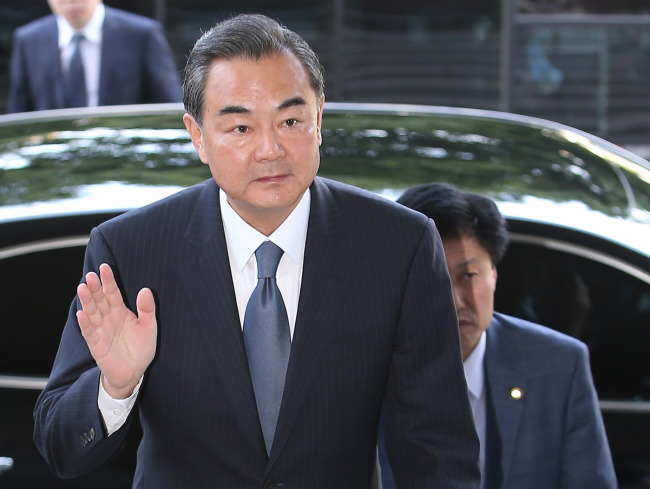The foreign ministers of South Korea and China on Monday agreed to step up cooperation to stop further North Korean nuclear tests and foster conditions for “meaningful” dialogue to make progress in its denuclearization.
Wang Yi’s two-day stay here came as Pyongyang has repeatedly threatened to carry out a fourth underground detonation and ratcheted up tension through maritime drills and verbal attacks against the Park Geun-hye administration.
 |
| Chinese Foreign Minister Wang Yi (Yonhap) |
With the peninsula situation topping the agenda, Wang and his counterpart Yun Byung-se also fine-tuned the schedule for President Xi Jinping’s state visit to Seoul slated for next month. They held consultations on two sessions before a dinner meeting at Yun’s residence.
Despite persistent differences over how to revive the six-nation denuclearization forum, they managed to share the view that it is “essential to resume meaningful dialogue that ensures substantive progress in the denuclearization of North Korea and prevents the development of its nuclear capability.”
“The two ministers concurred that North Korea’s recent actions, including nuclear activity, poses a grave threat to peace and stability on the Korean Peninsula and in the region,” the Foreign Ministry said in a statement.
“They agreed to reinforce bilateral and multilateral cooperation based on the shared position that they firmly oppose North Korea’s nuclear testing.”
Seoul, Washington and Beijing have in recent months been striving for a first round of the six-nation meeting since late 2008, which also involves the U.S., Japan and Russia.
But their efforts have made little headway as the allies demand steps to guarantee “sincere, substantive” advancement on the denuclearization issue, whereas China called for a swift, unconditional gathering.
“During past denuclearization talks, the North took advantage of them to beef up its nuclear capability and after the talks fell apart, we restarted them from a different starting point, with the North having an enhanced capability,” a senior ministry official told reporters on condition of anonymity after the ministerial talks.
“If it is sincere about coming back to the negotiating table, there should be measures to preclude such an upgrade. … And China apparently understood about the threshold.”
On the economic front, the sides pledged to speed up the negotiations over a bilateral free trade agreement and facilitate corporate activities.
Yun requested support for an easier acquirement of work and residence permits for Koreans in China and businesses’ plans to relocate or newly build plants there. He also stressed the need for efforts to prevent potential rows, such as over illegal fishing in Korean waters and North Korean defectors seeking to resettle here.
“The Korean Peninsula is in a grave situation due to North Korea’s threats of a nuclear test and signs of provocations,” Yun said at the beginning of the second, expanded session.
“Your visit provided us with a good opportunity to reaffirm our common standpoint that we will not accept North Korean nuclear weapons and about the significance of peace and stability on the peninsula, and to send a clear message to North Korea.”
Wang, for his part, displayed his “deepest condolences” for the victims of the ferry tragedy last month and their families, while saying that the two countries’ relationship was “at its best.”
“We’d like to have Korea as a closer cooperating partner in the face of the new, grave challenges in the region and the world,” Wang said, calling for joint efforts to safeguard peace and prosperity here.
Wang’s trip, his first as Beijing’s top diplomat, was a follow-up to Yun’s visit to the Chinese capital last year ahead of Park’s summit with Xi, during which the two leaders agreed to regular exchanges between the ministers to deepen strategic dialogue and coordination.
Later in the day, Wang paid a courtesy visit to Park and met with Cheong Wa Dae officials in charge of foreign and security policy.
By Shin Hyon-hee (heeshin@heraldcorp.com)

